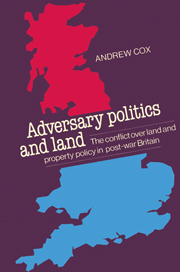Book contents
- Frontmatter
- Contents
- Preface
- PART A INTRODUCTION
- PART B THE PROBLEM OF LAND AND PROPERTY IN BRITAIN AND THE EFFECTIVE LIMITS ON GOVERNMENT POLICY INITIATION
- 2 The history of land and property policy in Britain and the development of social democratic solutions (1845–1945)
- 3 The structure of the British land and property market as constraint on policy initiation
- PART C THE HISTORY OF ADVERSARIAL POLICY FAILURE IN LAND AND PROPERTY IN POST-WAR BRITAIN
- PART D CONCLUSION
- Notes
- Index
2 - The history of land and property policy in Britain and the development of social democratic solutions (1845–1945)
Published online by Cambridge University Press: 29 September 2009
- Frontmatter
- Contents
- Preface
- PART A INTRODUCTION
- PART B THE PROBLEM OF LAND AND PROPERTY IN BRITAIN AND THE EFFECTIVE LIMITS ON GOVERNMENT POLICY INITIATION
- 2 The history of land and property policy in Britain and the development of social democratic solutions (1845–1945)
- 3 The structure of the British land and property market as constraint on policy initiation
- PART C THE HISTORY OF ADVERSARIAL POLICY FAILURE IN LAND AND PROPERTY IN POST-WAR BRITAIN
- PART D CONCLUSION
- Notes
- Index
Summary
The compensation and betterment problem. Modern land values policies and the social democratic solution of Uthwatt (1845–1942). The failure of Uthwatt and the social democratic solution between 1939 and 1945.
This chapter outlines the background to one major area of adversarial politics in British policy-making – the question of the role for the state in land and property development. This issue-area – generally referred to as land values policy – is particularly useful as a case study because it provides an example of the failure of adversarial policies to work in practice and provides us with an opportunity to try to explain both the power of policy initiation and the power of policy constraint. From this perspective it is possible to indicate why ‘middle-ground’ policies between a totally public or totally private role in land and development provide the best chance of successful implementation.
Later chapters of this book have to chronicle, not the realisation of this solution but the failure to recognise the need to find a workable compromise between the public and private sectors in this issue-area. The final result of this lack of awareness of the need for mixed, public and private involvement has been a policy impasse and repeated failure of policy implementation. These failures of implementation have occurred whether land values policy was politically on the right or the left of the ideological spectrum. Before we can look at these failures in more detail we need, however, to understand the historic role of the state in land values policy in Britain.
The problem hinges on the divergent views that are held about the role of the state in relation to two different but interconnected issues.
- Type
- Chapter
- Information
- Adversary Politics and LandThe Conflict Over Land and Property Policy in Post-War Britain, pp. 25 - 50Publisher: Cambridge University PressPrint publication year: 1984



